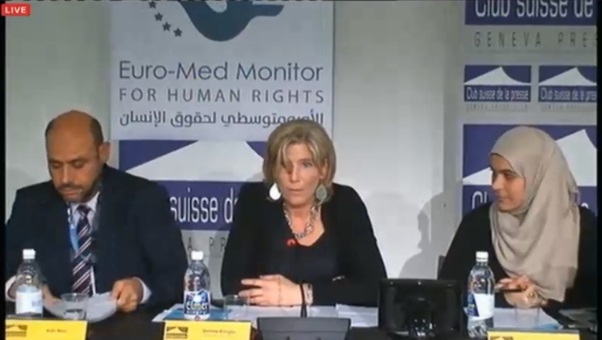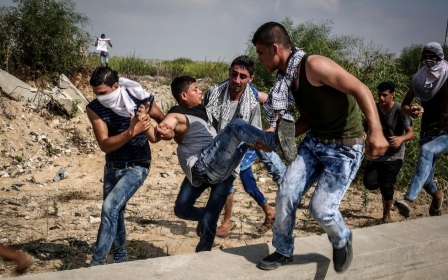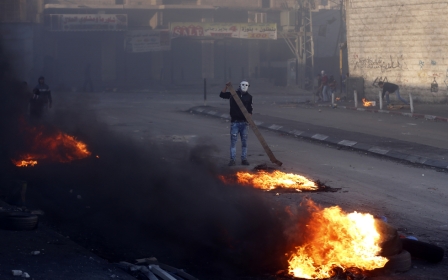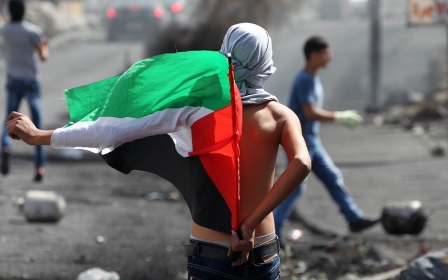Rights group calls Israel’s actions 'system of structural violence'

Euro-Med Human Rights Monitor issued a new report on Friday, saying that the Israeli military has used excessive force and committed arbitrary killings in the Palestinian territories.
In a press conference in Geneva, human rights expert Daniela Donges said regarding the latest escalation in violence: "The Israeli government believes it can violate the human rights of the Palestinians it controls with impunity. And who can blame them? It indeed has gotten away with apartheid and brazen war crimes for decades. If anything, it has been rewarded, with millions of dollars of so-called aid and weaponry from the United States and preferred trade status by Europe."
The report focused on the escalation over the past few weeks, as Israeli soldiers deployed on the border with the Gaza Strip and in the occupied West Bank.
It investigated the case of 13-year-old Ahmed Manasra in Jerusalem, whose video clip went viral on social media after he was left bleeding while an Israeli was cursing him and wishing him death. The report collected eyewitness accounts stating that Manasra “was beaten with sticks and metal pipes in the town of Hezma, north Jerusalem.
Meanwhile, an Israeli police spokesperson said that Manasra was shot when he attempted to stab an Israeli. Euro-Med reported that has been admitted to the Israeli hospital Hadassah Ein Kerem with serious injuries, under continued detention.
Among the other many cases that the report showed in a press conference is Israa Abed, 29, a Palestinian holding an Israeli ID.
Abed "is another example of Israel’s deliberate targeting and arbitrary killing of civilians," the report said.
"Like the others, Israeli authorities claimed Abed attempted to stab an Israeli soldier. However, video recordings from surveillance cameras in the central train station of the city of Afula, where the incident took place, documented Israeli authorities’ reckless disregard for life.”
Dr. Rami Abdu, chairman of Euro-Med Monitor, says his team has collected evidence from eyewitnesses accounts that Abed was terrified when she found herself surrounded by Israeli soldiers pointing weapons at her.
“The soldiers shouted at her to remove her headscarf and drop her bag. The young woman refused to remove her hijab, but raised her hands and begged the officers not to shoot. Nonetheless, the soldiers shot her with four live bullets in the upper part of her body”.
“If there is no term to describe such atrocities, then it is surely structural violence committed by Israeli troops,” added Abdu.
Call for action
During the press conference, Abdu called on the Israeli government to open a credible and transparent investigation into these incidents, and to bring the perpetrators to justice.
“Ignoring such incidents gives a green light to other perpetrators and signals a complete disregard for human life,” added the report.
Furthermore, the organisation called on signatories to the Geneva Convention to take concrete steps to pressure Israel to comply with international law.
Friday's clashes at border areas in the Gaza Strip resulted in at least two dead and over 70 injured, according Dr. Ashraf al-Qidra, spokesman for Gaza's Health Ministry.
The Euro-Med group invited two UN Special Rapporteurs focusing on extrajudicial and arbitrary executions and human rights in the Palestinian territories to visit the region and open an investigation into the incidents described in the report.
New MEE newsletter: Jerusalem Dispatch
Sign up to get the latest insights and analysis on Israel-Palestine, alongside Turkey Unpacked and other MEE newsletters
Middle East Eye delivers independent and unrivalled coverage and analysis of the Middle East, North Africa and beyond. To learn more about republishing this content and the associated fees, please fill out this form. More about MEE can be found here.




